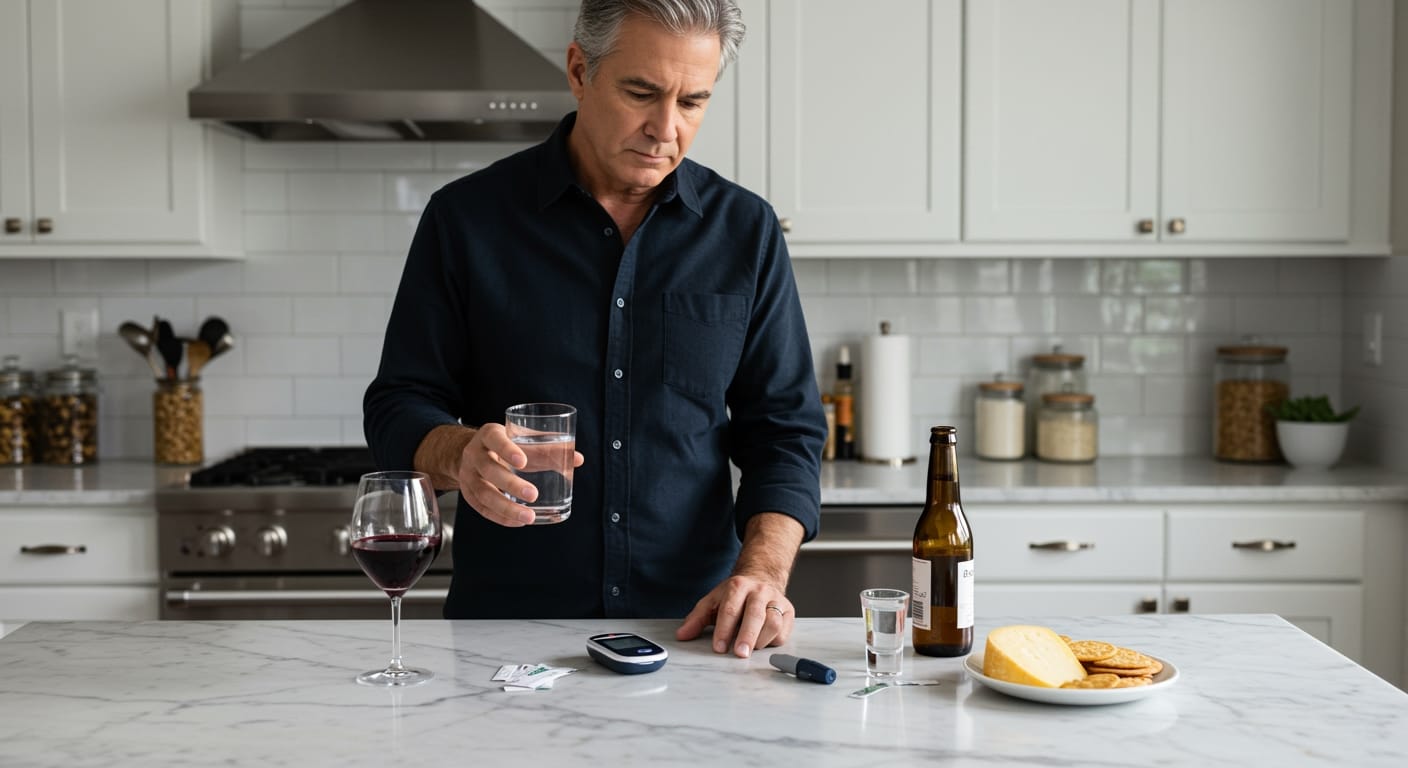✪ Key Takeaway: Diabetics can drink alcohol in moderation with proper planning, but must monitor blood sugar closely to prevent dangerous hypoglycemia.
Introduction
You sit at dinner watching everyone else enjoy their wine while you sip water, wondering if that glass will send your blood sugar into chaos.
This question haunts millions of diabetics who want to enjoy social occasions without compromising their health or feeling left out of normal activities.
Hi, I’m Abdur, your nutrition coach, and today I’m going to explain exactly how alcohol affects your blood sugar, which drinks are safer choices, and the specific strategies that can help you drink responsibly while managing diabetes.
How Does Alcohol Actually Affect Blood Sugar?
Alcohol creates a complex reaction in your body that most people completely misunderstand.
Your liver normally releases stored glucose to keep your blood sugar stable between meals.
When you drink alcohol, your liver shifts its focus to processing the alcohol instead of maintaining your blood glucose levels.
This creates a dangerous situation where your blood sugar can drop suddenly and severely, especially if you take insulin or certain diabetes medications.
The timing matters more than most people realize.
Your blood sugar might actually rise initially from the carbohydrates in alcoholic drinks, then crash hours later when the alcohol processing interferes with your liver function.
This delayed hypoglycemia can happen up to 24 hours after drinking, making it particularly dangerous because you might not connect the symptoms to alcohol consumption.
✪ Pro Tip: Never drink alcohol on an empty stomach as this accelerates absorption and increases hypoglycemia risk.
Which Alcoholic Drinks Are Safer for Diabetics?
Not all alcoholic drinks affect your blood sugar the same way.
Pure spirits like vodka, gin, whiskey, and rum contain zero carbohydrates and cause the least immediate blood sugar spike.
Dry wines contain minimal residual sugar and typically have 3-4 grams of carbohydrates per 5-ounce serving.
Light beers generally contain 5-10 grams of carbohydrates per 12-ounce serving, making them a moderate choice.
The drinks you should avoid completely include sweet cocktails, dessert wines, regular beer, and anything mixed with sugary sodas or fruit juices.
These drinks can contain 20-40 grams of carbohydrates per serving, causing significant blood sugar spikes.
Even seemingly innocent mixers like tonic water contain 32 grams of sugar per 12 ounces, turning a zero-carb spirit into a high-sugar disaster.
✪ Fun Fact: Diet mixers contain artificial sweeteners that do not affect blood sugar, making them safer choices for diabetics.
What Are the Safe Drinking Guidelines for Diabetics?
The American Diabetes Association provides specific guidelines that many diabetics have never heard from their doctors.
Women with diabetes should limit alcohol to one drink per day, while men should limit consumption to two drinks per day.
One drink equals 12 ounces of beer, 5 ounces of wine, or 1.5 ounces of distilled spirits.
You should never drink alcohol if your blood sugar is below 100 mg/dL or above 180 mg/dL.
Always eat food when drinking alcohol to slow absorption and provide your body with glucose reserves.
Check your blood sugar before drinking, two hours after your last drink, and before bed to monitor how alcohol affects your individual response.
Carry glucose tablets or a fast-acting carbohydrate source whenever you drink alcohol, and make sure someone with you knows the signs of severe hypoglycemia.
✪ Note: Alcohol can mask the early warning signs of low blood sugar, making dangerous hypoglycemia harder to detect.
When Should Diabetics Completely Avoid Alcohol?
Certain medical conditions and situations make alcohol consumption extremely dangerous for diabetics.
If you have diabetic neuropathy, alcohol can worsen nerve damage and increase pain significantly.
People with diabetic retinopathy should avoid alcohol because it can worsen eye complications and increase bleeding risk.
If you have a history of pancreatitis, alcohol consumption can trigger life-threatening pancreatic inflammation.
Diabetics with kidney disease should avoid alcohol completely because it puts additional stress on already compromised kidneys.
Never drink alcohol if you take medications like metformin, sulfonylureas, or insulin without consulting your doctor first.
If you have frequent episodes of hypoglycemia or poor blood sugar control, alcohol will make these problems significantly worse and potentially life-threatening.
✪ Pro Tip: Always wear a medical alert bracelet when drinking so emergency responders know you have diabetes if hypoglycemia occurs.
The Bottom Line
Diabetics can drink alcohol safely with proper planning, blood sugar monitoring, and strict adherence to recommended limits.
As I always tell my clients, “Your health is not negotiable, but your social life does not have to be either – the key is finding the balance that works for your body.”
I would love to hear about your experiences with alcohol and diabetes management – please share your questions, concerns, or success stories in the comments below so we can learn from each other.
References
At NutritionCrown, we use quality and credible sources to ensure our content is accurate and trustworthy. Below are the sources referenced in creating this article:
- MedlinePlus: Diabetes and alcohol
- Diabetes Canada: Alcohol and diabetes
- Cleveland Clinic: Drinking Alcohol and Diabetes: Do They Mix?
- Mount Sinai: Diabetes and alcohol
- PubMed Central: Alcohol and Diabetes: How Does Alcohol Affect Blood Sugar?





